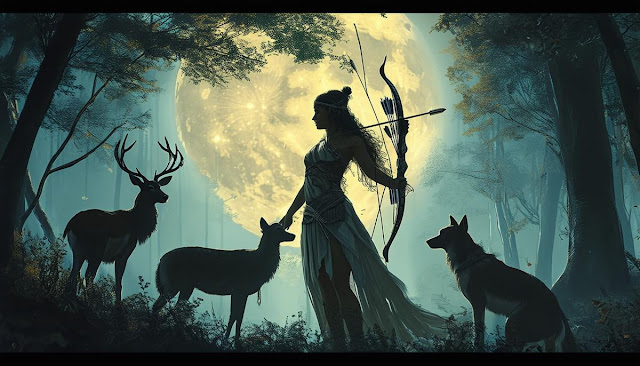The Sea: the Unknown, the Subconscious, the Uncontrolable Fate
THE DRY SALVAGES
T.S. Eliot
I
"I do not know much about gods; but I think that the river
Is a strong brown god1—sullen, untamed and intractable,
Patient to some degree, at first recognised as a frontier2;
Useful, untrustworthy, as a conveyor of commerce;
Then only a problem confronting the builder of bridges.
The problem once solved, the brown god is almost forgotten
By the dwellers in cities—ever, however, implacable.
Keeping his seasons and rages, destroyer, reminder
Of what men choose to forget. Unhonoured, unpropitiated
By worshippers of the machine, but waiting, watching and waiting.
His rhythm was present in the nursery bedroom,
In the rank ailanthus of the April dooryard,
In the smell of grapes on the autumn table,
And the evening circle in the winter gaslight."
1- The Flow of Life in the human realm, originating in Poseidon, the Cause of motion in the Cosmos. Blood flowing through the veins. The pranic soul through the yogic nadis. Prana and the vital soul. Brown because it is sullied by matter or body.
2 - Posi desmos, "foot fetter", "what disables to cross over", one of the etymologies of Poseidon given by Socrates in the Cratylus, in the sense that while embodid in the physical, its is not time to cross into the astral. But that etymology contradicts the essence of Poseidon, who, as the Earth-Shaker, is a breaker of boundaries and a destroyer. Note that Neptune and Poseidon hold a trident like Shiva. As such he was a feared god, the cause of earthquakes and destruction from the sea.
The most likely etymology of Poseidon comes from archaic greek Poti, Lord, and either Da, "Earth", or Davon, the archaic doric for water, thus rendering Him "The Lord of Earth" or "The Lord of Water(s)". Water because it is always in motion, and He is cause of motion, the power behind waters, and also the cause of motion in the Earth.
"The river is within us3, the sea4 is all about us5;
The sea is the land's edge also, the granite
Into which it reaches, the beaches where it tosses
Its hints of earlier and other creation:
The starfish, the horseshoe crab, the whale's backbone;
The pools where it offers to our curiosity
The more delicate algae and the sea anemone.
It tosses up our losses, the torn seine,
The shattered lobsterpot, the broken oar
And the gear of foreign dead men. The sea has many voices,
Many gods and many voices.
The salt is on the briar rose,
The fog is in the fir trees.
The sea howl
And the sea yelp, are different voices
Often together heard: the whine in the rigging,
The menace and caress of wave that breaks on water,
The distant rote in the granite teeth,
And the wailing warning from the approaching headland
Are all sea voices, and the heaving groaner
Rounded homewards, and the seagull:
And under the oppression of the silent fog
The tolling bell
Measures time not our time, rung by the unhurried
Ground swell, a time
Older than the time of chronometers, older
Than time counted by anxious worried women
Lying awake, calculating the future,
Trying to unweave, unwind, unravel
And piece together the past and the future,
Between midnight and dawn, when the past is all deception,
The future futureless, before the morning watch
When time stops and time is never ending;
And the ground swell, that is and was from the beginning,
Clangs
The bell."6
3 - 'The river within us' - the Life within us, motion. Same as 1. The vital soul.
4 - 'The sea' - going, travelling, transformation, birth, death, Samsara. The Odyssey through the sea, the journey of the soul through the ever-moving stars, of which the sea is a metaphor. The astral plane. Okeanos (sky) as it encircles Hades (sublunary realm), Thetys and Amphitrite as the Life and lives in it, and Poseidon as its cause.
Although it is not the Sun that moves, but rather the soul. As it ascends to the higher astral, the Sun becomes more powerfull. As it descends into the lower astral and material world, the Sun loses its strength. This is a metaphor for the rational part of the soul which illuminates it. The more rational or aware, the more powerfull, like Helios on his chariot, controlling his horses (passionate and irrational parts). The more passionate and irrational, the less in control of its "horses", and the sun looses its strength, plunging into the lower astral and the material world.
5 - "is all about us" - just as the sky where stars perpetually move (the sea) encircles the Earth and surrounds it by all sides. Same as above.
6 - All of this verse could be a poetic description of the astral realm.
'The sea is the land's edge' - where the astral ends, the physical begins;
'It tosses up our losses' (...) ' the gear of foreign dead men' - failed oportunities and unused potential, cyclicaly returning from the past in the form of new, auspicious ones. The 'Dry Salvages'.
'Are all sea voices, and the heaving groaner' - the ghosts, the voices from the past;
'Many gods, many voices' - indeed the astral is a sea of souls and demigods;
'Older than the time' - the astral is older, i.e., precedes the physical;
'The Bell' - the order to move from Poseidon, to keep on going. To stop is to die, to move is to live, Motion is Life.
.jpg)







Comentários
Enviar um comentário